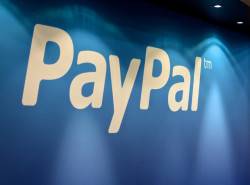Join Our Telegram channel to stay up to date on breaking news coverage
NEW YORK (InsideBitcoins) — PayPal looks at Bitcoin and sees a great deal of potential, but unfortunately the vision is less than clear — obscured by a thick regulatory fog that looms over the digital currency.
In fact, according to Roman Leal, a member of the Corporate Strategy team at Paypal, the greatest opportunity may be in its technological implications well beyond simply payments.
“PayPal is obviously pretty late to the game but we realize that we are late and want to get engaged rather quickly,” Leal said at the recent North American Bitcoin Conference. “So we are thinking through exactly what that role of engagement is. From marketplaces and Stubhub that could potentially accept virtual currencies, to PayPal and [recently acquired ecommerce payment processor] Braintree.”
Navigating the regulatory landscape
The recent “BitLicense” proposal issued by the New York Department of Financial Services (DFS) is just one wall of the legal maze that needs to be cleared.
“One of the biggest issues I think internally we’re facing is what does the regulatory landscape look like one-year out, five-years out, ten-years out,” he said. “Those are, unfortunately, some of the hurdles that have kept us back and continue to represent somewhat of a challenge. I think as those clouds start to dissipate, not just PayPal, but a lot more incumbents are going to get very serious about these currencies.”
Beyond that, the matters of consumer benefits and merchant profits need to be addressed.
“I think on the merchant side, which is very important for [payment] incumbents, the value proposition is pretty clear: it’s cheaper and it’s near real-time — and that becomes more and more important as the transactions become cross-border. Once you start looking at the consumer, it gets to be a little trickier. I think where as an industry we’re going to struggle is to really create a value proposition for the individual consumer to use this as a payment mechanism domestically. Credit cards work pretty well. We’re facing that issue with mobile payments. It’s just not taking off.”
Tapping the Bitcoin technology
Leal was with Goldman Sachs until May, where he co-authored a research report on Bitcoin.
“I focused a lot on what merchants pay today in online and offline retail [to process payments] which is 2.5% to 3.5% on average, which means the Walmarts pay much less but the mom and pops pay much more, and what are the savings those merchants can generate by using Bitcoin.”
Leal said that ultimately the reason financial services companies like PayPal, Visa and MasterCard, as well as technology giants, are going to look at Bitcoin is because of the underlying technology.
“They’re going to say, ‘How can we build on this technology, and do things well beyond payments,” Leal concluded.
The Goldman Sachs report
The Goldman Sachs report, published in March, reflects that view.
“What is Bitcoin?” the report said. “The short answer is that Bitcoin with a capital “B” is a peer-to-peer network that allows for the proof and transfer of ownership without the need for a trusted third party. The unit of that network is bitcoin with a little ‘b.’
“But agreement on the topic seems to end there; indeed, there is a deep divide between true Bitcoin believers and serious skeptics. We look at the range of wildly diverging views. So where does that leave us? With the conclusion that bitcoin likely can’t work as a currency, but some sense that the ledger-based technology that underlies it could hold promise.”
Written by Hal M. Bundrick
Join Our Telegram channel to stay up to date on breaking news coverage


